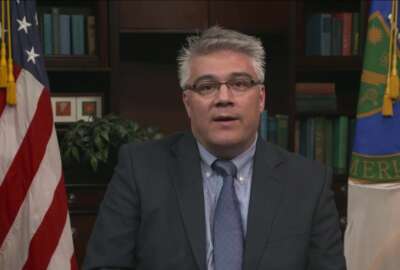
This bipartisan bill would give the GSA new cybersecurity responsibility
A bill before the House would create a new cadre of people to help the government in case of a serious cyber attack. The National Digital Reserve Corps would be...
A bill before the House would create a new cadre of people to help the government in case of a serious cyber attack. The National Digital Reserve Corps would be managed by the General Services Administration. To learn more about the Corps, the Federal Drive with Tom Temin spoke with Texas Congressman Tony Gonzales.
Interview transcript:
Tony Gonzales
First off, I am a retired Navy Master Chief. I spent 20 years and in the Navy as a naval cryptologist, with a top secret SCI clearance. I spent five years in Iraq and Afghanistan. And so to me, information warfare technology, the digital space is something that I consider my expertise. And when I came to Congress, this is something I’ve learned much is important to me. Now my district, District 23, in Texas. It stretches from San Antonio to El Paso. It’s over 800 miles of the southern border. Places like Uvalde, Del Rio, Eagle Pass, El Paso are in the district, so a lot of my attention gets put on the border. But to me, this Digital Reserve Corps, is an important piece of legislation that gets a head of a problem. And I’ll give you an example. Last year in Texas, there was this huge winter storm that came through and everybody’s power and water was knocked out for about a week or so. It didn’t matter the color of your skin, didn’t matter how much money you had in your bank account. If you lived in a city, big city or a small little town, everybody was without power. So I envision, that the next storm that comes through, won’t be a winter storm, it’ll be a cyber storm. And when that hits who turns the power back on? This piece of legislation gets to answering, who and how and gets us ahead of it.Eric White
Gotcha. You mentioned the cyber storm. I imagine, cyber attacks of course, is on there. But what other sorts of preventative measures do you think this digital reserve corps could help with? Maybe not even preventative, just having a plan of action in place, if something does occur?Tony Gonzales
In the digital space, you’re seeing intrusions happen every single minute of every single day And it’s no longer, it used to be a time where cyber was predominantly in the national security and defense space. And now it’s in everything, absolutely every aspect of life, it’s in education and health care in every bit. I often say companies are IC companies first, and then they do other stuff, then they sell oil or they make widgets or they teach or whatever it may be. And it’s not a matter of it happens, it’s a matter of when something major happens. You’ve seen it with the Colonial Pipeline. You’ve seen it with these intrusions on schools and healthcare providers, and water infrastructure. So it’s happening every single day. The key to me is what are we going to do about it when a major intrusion happens? And so in particular, this bill federalizes IT professionals for a short period, let’s say 60 days. What does that mean? OK, so I live in San Antonio. Let’s say the city of San Antonio gets wiped out, nobody has power of water because of a cyber attack. Well, who turns that back on? And part of it is every one of these major companies, and even small companies, has an IT infrastructure. What this bill does, it allows these IT professionals to serve in a federal capacity for a limited amount of time. So let’s say, you love your country, you want to help turn the lights back on, but you don’t want to join the Marines. Well, this is an avenue where you can help your country get the lights back on, when when a major intrusion happens.Eric White
As someone, as you mentioned, who had a top secret security clearance, looking at this from a policy standpoint, that seems like one of the major hurdles, is going to be able to keep a reserve corps that is able to maintain that security clearance. And even when they’re not on duty, what do you foresee as a mechanism for improving that process to enable this?Tony Gonzales
Yeah, one of the benefits is, I’m a firm believer in creating an ecosystem that that allows for you to tackle some of these problems. And to me, that ecosystem is government, its industry, and it’s academia. When you get those three areas in a room, good things happen. So in this case, industry would be the ones that would have the professionals where we would have the workforce. And I envision government, as the one that the avenue that could one, help with security clearances. So that’s an avenue that I think would make it enticing for people to be part of the digital corps, help with security clearances. The other is help with continuous training. And once again, I spent a lot of time in the military, I retired from the military. You train the way you fight, you fight the way you train. We can’t have this major cyber intrusion happen, and then let that be the time in which we react. We got to get ahead of it. So it just starts getting us down a path of collaboration and thinking of how we’re going to react when something like this occurs.Eric White
This has been an idea, that’s been around before former Texas representative Will Hurd, who I’m sure you’re familiar with, brought on a similar idea years ago and kept on trying to push it before he left Congress. What’s different this time around that you think there’ll be more momentum?Tony Gonzales
I was really excited last year. It’s very bipartisan. I’ve focused on real, tangible solutions. Politics right now, is very divided and contentious. But cyber and getting ahead of a cyber intrusion is something I think that brings us together. So last year, we introduced this, and it actually got passed in the House. There were over 800 amendments to the NDAA, the National Defense Authorization Act. This piece of legislation, the National Digital Reserve Corps, had the second most amount of cosponsors. So it’s not as if there’s just one or two members that are signed on. It’s been dozens, and so it’s incredible. Now went over to the Senate, and it kind of died. And the White House had some issues with kind of who was going to control the program. But I’m very optimistic this year, that we can work through all that. And we can ultimately get it over the finish line and signed into law. I’ll just say one last thing. Last year, there were around 100 pieces of legislation from the House, that got signed into law out of 10,000. And one of those pieces of legislation was mine. I’m very proud of that. So the way I look at it, if I can pass a piece of legislation in the minority, I feel good about passing legislation in the majority.Eric White
And yeah, just finishing up here. Can you just tell me about the landscape of why something like this would be important? What do you foresee as the future in digital warfare as an expert in that area?Tony Gonzales
Yeah, we’re already there. The future is now. And we’re getting tidbits of it. Throughout the country, it’s not just one part. And I will go back to the Colonial Pipeline, just because that seems to be fairly, fairly new, or fairly recent. And it impacted a lot of lives. If you have one piece of infrastructure that gets shut down. It all comes down. And once again, if you lived in Texas, you will never forget the winter storm last year. I mean, everybody will remember that. So I think this is something, that like I said, this is a problem that’s already here. What are we going to do about it when it gets larger? So I’m excited about continuing to work with my colleagues here in the House. To continue to work with my colleagues in the Senate, so we’ll get it through the finish line. And then ultimately with the White House, so we can get this signed into law. But very excited about the National Digital Reserve Corps and look forward to continuing to include industry in it as well. Industry needs to have a seat at the table, and academia as well. I’ll just say like, I’m a cryptologist. And there is one cryptologist in Congress. So a lot of people want to have cyber bills. Sometimes you can cause more harm than good with a bill. We’ve really tried to think this through to make it a win win for everybody.
Copyright © 2025 Federal News Network. All rights reserved. This website is not intended for users located within the European Economic Area.
Tom Temin is host of the Federal Drive and has been providing insight on federal technology and management issues for more than 30 years.
Follow @tteminWFED
Related Stories





